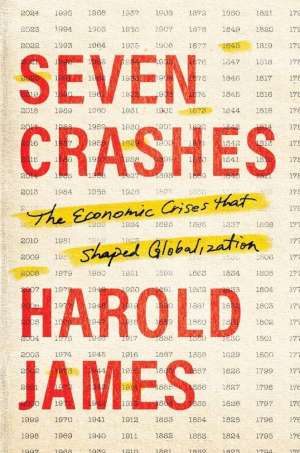21 March 2024
Seven Crashes
The Economic Crises That Shaped Globalisation
Harold James
2023, Yale University Press, 367 pages,
ISBN 9780300263398
Reviewer: Ian Harwood

Despite the trauma generated by the global financial crisis and, subsequently, the global pandemic and the acute fears of “de-globalisation” both these seismic “once-in-a-lifetime” events engendered, we continue to live in an increasingly globalised world. International trade in goods and services keeps expanding, capital continues to flow in search of the most attractive global investment opportunities while worldwide digital communication becomes ever more pervasive.
Such ever-increasing globalisation, however, certainly can’t be taken for granted. Indeed, as we’re all too painfully aware, multiple threats abound which threaten its abrupt reversal – whether in the form of increasingly acute geo-political tensions or greatly enhanced concerns to safeguard both domestic producers and vulnerable supply chains.
Given such clear threats to the present status quo, knowledge of how the current state of intense global interconnectedness came about – and, in particular, what went right and, conversely, wrong in this long-lived and continually evolving process – serves an exceptionally useful purpose at the present juncture. Happily, access to such a source of fount of wisdom is handily provided by Harold James in his most recent book.
James has written widely and extensively throughout the course of a long and distinguished academic career, focusing principally upon German and European economic and financial history. He is also the International Monetary Fund’s official chronicler (his “The IMF and the European Debt Crisis” was published earlier this year). Importantly, moreover, James also has excellent past form on the globalisation score, beginning with his “The End of Globalisation” which addressed the widespread reverses brought about by the Great Depression and which was published over two decades ago.
His latest contribution to this pivotal genre comprises an examination of seven key episodes in the history of the modern globalisation process. James begins with the widespread European famine and political unrest of the 1840s, moves onto the 1873 world financial crisis and, thence, focuses successively upon WW1 and the subsequent hyper-inflations, the Great Depression, the Great Inflation of the 1970s, the Global Financial Crisis and, finally, the coronavirus pandemic and the worldwide lockdown this provoked.
Several of the episodes constituted supply shocks (both negative and positive) while others constituted adverse demand shocks. A key argument is that the supply shocks had the general effect of advancing the progress of globalisation while the adverse demand shocks worked in the contrary direction, served to brake the globalisation process and, even, put it into reverse. Such a distinctive argument (to your reviewer at least) appears wholly original. Importantly, moreover, it is a highly persuasive and thought-provoking thesis.
James’ treatment of all these critical episodes contains a consistently absorbing wealth of detail – whether in the economic, social or political spheres – in support of his major thrusts of argument. His analysis is also characterised by an intense focus upon the advance of science and technology (aka “human ingenuity”) and the application thereof.
A further facet of his analysis which warrants especial mention are his extensive “pen portraits” of particularly influential economists with an emphasis upon their seminal contributions to ongoing academic and policy debates. Unsurprisingly, Keynes receives a considerable amount of attention in this connection but so do Marx, Jevons, Hayek, Friedman, Bernanke, Summers and Chetty.
Overall, this is an impressive book which covers an exceptional amount of ground and is, moreover, highly readable. “Seven Crashes” is also arguably essential reading at the present juncture, as the lessons it adduces from the prior history of globalisation can only be helpful in navigating the considerable challenges to globalisation which currently confront us.
